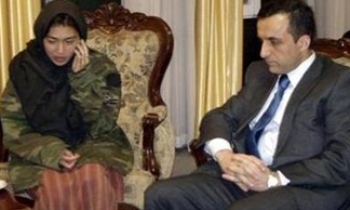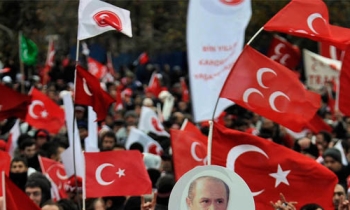Reporters sans Frontières (RSF) and Friends of Maldives have launched an international campaign for the release of the daily Minivan's young photojournalist Jennifer Latheef, who completed Sunday her third month of a 10-year prison sentence for a supposed "terrorist act" based on her involvement in the September 20, 2003 civil unrest.

Latheef is being held in appalling conditions in a prison on the island of Maafushi, some 20 km south of the capital Malé. She is shut up in a small, filthy cell in a building where political and ordinary prisoners are lumped together. The cell's toilet is blocked, and emits a terrible stench. She has no access to water that is fit to drink, or the daily treatment she needs to regulate her blood sugar level, RSF statement said.
From her cell, she has rallied fellow detainees to press for an improvement in prison conditions. She is also trying to set up sports sessions to avoid the health problems that result from long periods of imprisonment.
She is often insulted by other detainees. Spoiled food and stones are thrown into her cell. In early November, she sent her family a note written in her cell entitled "The solution," in which she said: "The lack of freedom of expression has made us incapable of articulating and defending the rights of other people. But this repression also makes us unable to understand and defend our own rights."
To prevent her from appealing, the authorities refused to hand over to her family a copy of the document certifying her conviction. Maldivian law allows 90 days to file an appeal. Latheef was convicted of terrorism in connection to the demonstrations in Malé following the custodial killing of five prisoners in Maafushi Jail on September 20, 2003.
Jennifer Latheef said in her police statement that she had only been present on the streets of Malé on September 20, 2003 as a concerned observer. This statement was given while she was being questioned by the police while under detention for 58 days in 2003. Since then Latheef has not changed her statement and has strongly denied the charges against her throughout her trial which lasted for 14 months.
Amnesty International has stated that "the charges against Jennifer Latheef are politically motivated" and that she has not "received a fair trial." Jennifer Latheef is a source of strong opposition to the regime of President Gayoom. According to Minivan News, she has:
� been arrested multiple times between 2003 and 2005;
� spent 135 days in police detention;
� had her passport confiscated in January 2004 forcing her to petition the government for the right to travel abroad;
� been intimidated by the police through dawn visits to her home and other means; and now;
� thrown into jail for 10 years as a terrorist.

To pressure the Maldivian government, Friends of Maldives has decided to target the archipelago's tourism industry (500,000 foreign visitors a year) and distributed more than 3,000 flyers about Latheef at last month's World Travel Market in London.
On December 10, Friends of Maldives launched a campaign for tourists to boycott specific named resorts in the Maldives that are linked to leading members of the regime. The list of resorts to avoid is available at www.friendsofmaldives.org. More than 800 people have already signed a petition for Latheef's release on the RSF website http://www.rsf.org/article.php3 ?id_article=15623.
A poster campaign about "Dictator Paradises" was launched in Paris on November 21. More than 500 posters have been put up in the streets of the French capital condemning Latheef's imprisonment.
International publications such as Marie-Claire of Spain and the French magazine Photo have agreed to adopt Latheef, undertaking to run articles about her case and to write to the authorities requesting her release.
Friend of Maldives has written to Britain's 700 parliamentarians asking them to adopt a firmer stance on President Abdul Gayoom's government. The British foreign office has promised to undertake new diplomatic initiatives to obtain the release of Maldives' prisoners of conscience. Dr Kim Howells, the British foreign office minister responsible for South Asia, recently said in parliament that the trials of Mohamed Nasheed and Jennifer Latheef seem to have been politically motivated.









